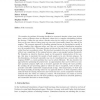Free Online Productivity Tools
i2Speak
i2Symbol
i2OCR
iTex2Img
iWeb2Print
iWeb2Shot
i2Type
iPdf2Split
iPdf2Merge
i2Bopomofo
i2Arabic
i2Style
i2Image
i2PDF
iLatex2Rtf
Sci2ools
139
click to vote
JMLR
2008
2008
Max-margin Classification of Data with Absent Features
We consider the problem of learning classifiers in structured domains, where some objects have a subset of features that are inherently absent due to complex relationships between the features. Unlike the case where a feature exists but its value is not observed, here we focus on the case where a feature may not even exist (structurally absent) for some of the samples. The common approach for handling missing features in discriminative models is to first complete their unknown values, and then use a standard classification procedure over the completed data. This paper focuses on features that are known to be non-existing, rather than have an unknown value. We show how incomplete data can be classified directly without any completion of the missing features using a max-margin learning framework. We formulate an objective function, based on the geometric interpretation of the margin, that aims to maximize the margin of each sample in its own relevant subspace. In this formulation, the l...
| Added | 13 Dec 2010 |
| Updated | 13 Dec 2010 |
| Type | Journal |
| Year | 2008 |
| Where | JMLR |
| Authors | Gal Chechik, Geremy Heitz, Gal Elidan, Pieter Abbeel, Daphne Koller |
Comments (0)

